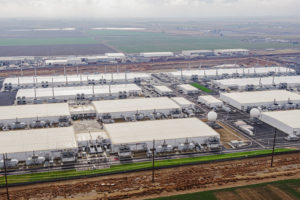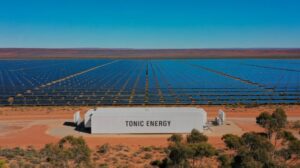Industrial demand leads to an American power crunch — This Week in Cleantech


A Microsoft datacenter site in Quincy, Washington. (CNW Group/Ballard Power Systems Inc.)
This Week in Cleantech is a new, weekly podcast covering the most impactful stories in cleantech and climate in 15 minutes or less. Produced by Renewable Energy World and Tigercomm, This Week in Cleantech will air every Friday in the Factor This! podcast feed wherever you get your podcasts.
This week’s “Cleantecher of the Week” is EDP CEO Miguel Stilwell d’Andrade!
Spain saw extremely low day-ahead electricity prices last week, remaining below €10 per megawatt-hour, along with some record-high clean energy production at almost 14 gigawatts in February. At one point, prices reached €2 per megawatt hour, compared to €67 per megawatt hour in France.
This market slump has impacted utility earnings – Spain’s Endesa SA said its 2023 profit dropped nearly a third. Power flows have also changed. With energy prices this low, Spain can now sell electricity even to France, one of Europe’s biggest energy exporters.
Exxon is the largest investor-owned oil company and among the top polluters. Yet CEO Darren Woods claims big oil is not responsible for the climate crisis, and that we are responsible instead. Woods argues that the clean energy transition is too pricey, claiming people aren’t willing to foot the bill.
Despite knowing big oil is a big driver of the climate crisis, the company funded decades of front group activity to talk down climate science. They also asked politicians to attack climate solutions technologies that could provide consumers with affordable alternatives but would eat into the company’s profits.
New York state has agreed to buy electricity from offshore wind farms in the Atlantic, which now gives hope to an industry that was hit hard by inflation. Selected projects will produce over 800 construction jobs and invest $2B in economic development statewide.
One of the selected projects is from Orsted, who recently had to cancel two offshore wind projects with a planned capacity of over 2,200 MW combined because of high inflation and rising interest rates. This new award will help Orsted reduce its losses to about $261 million, compared to a $798 million loss without it.
Watch the full episode on YouTube
Methane accounts for about 1/3 of global warming, and the IEA predicts that 75% of this pollution could be avoided, often at no cost.
A new satellite led by MethaneSAT will monitor regions responsible for 80% of the world’s methane supply, revealing the largest methane polluters in the oil and gas industry. It is scheduled to transmit data later this year. It can zoom in on individual oil and gas basins, fields, and even facilities. Once the data has been vetted for accuracy, companies must find the cause of the leak, share it with federal regulators, and fix the issue if it violates the Clean Air Act.
As demand for industrial power increases to record highs, utilities are struggling to keep up, projecting that there won’t be enough transmission capacity. Demand for electricity doubled from 2022 to 2023, mostly due to AI enabling us to quickly build large warehouses that require a lot of energy. The nation’s 2,700 data centers used over 4% of the country’s total electricity in 2022. By 2026, that number is estimated to reach 6%.
With the grid unable to keep up with these demands, it has delayed coal plant closures and paused data center incentives in some states.
Help make This Week in Cleantech the best it can be. Send feedback and story recommendations to rew@clarionevents.com. And don’t forget to leave a rating and review wherever you get your podcasts.
Join us every Friday for new episodes of This Week in Cleantech in the Factor This! podcast feed, and tune into new episodes of Factor This! every Monday.
This Week in Cleantech is hosted by Renewable Energy World senior content director John Engel and Tigercomm president Mike Casey. The show is produced by Brian Mendes with research support from Alex Petersen and Clare Quirin.




